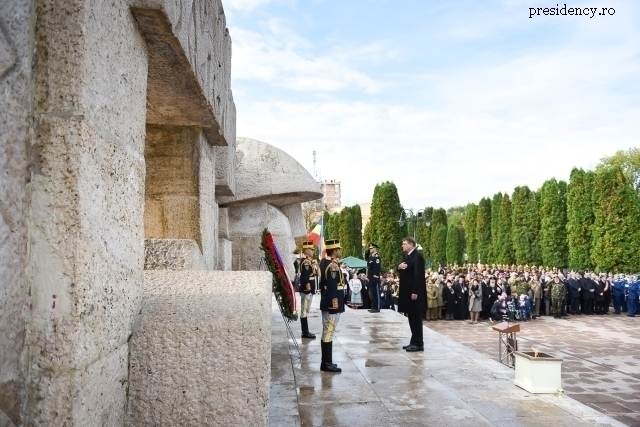A Day of Special Significance
On October 25, Romanians celebrate both Army Day, and the anniversary of their last sovereign.

Bogdan Matei, 25.10.2016, 13:28
October 25th is the Day of the Romanian Army, celebrated with military and religious ceremonies across the country and in theatres of operations abroad. Defence Minister Mihnea Motoc highlighted the importance of this day:
Mihnea Motoc: “On this day, we honour the traditions of the Army, handed down from one generation to the next, from the brave founders of our nation to the military of the third millennium, hardened in theatres of operations. It is the day when we honour all the heroes fallen in the battles fought by our Army throughout its history. It is an opportunity to thank the veterans of our Army, both the brave survivors of World War II, and those who have taken part in international missions over the past few decades.
One of the institutions enjoying the highest level of public confidence, as indicated by all opinion polls conducted in post-communist Romania, the Romanian Army is also celebrated in the neighbouring Republic of Moldova. Moldovan Defence Minister Anatol Salaru, spoke about the sacrifice of the Romanian soldiers who had died in World War II. It is thanks to those who gave their lives for faith, truth and nation at that time, that the current generations may speak Romanian, the defence minister in the pro-Western government in Chisinau pointed out.
The day of October 25th is itself tied to World War II. On this day in 1944, by seizing the town of Carei in the north-west, the Army freed the last plot of the Romanian territory occupied by Hungarian troops up to that point. Both the protagonists of that moment, and historians agree that this event could have taken place earlier and that officers chose to allow their troops to rest for a few days, so as to have the final attack and the victory coincide with the anniversary of King Michael I, who was also the commander of the Army.
Born on October 25th, 1921, King Michael I was the last of the four sovereigns in the German dynasty of Hohenzollern-Sigmaringen, who acceded to the throne in 1866 and built the modern Romanian state. Michael I came to power in 1940, after his father, the unpopular Carol II, had stepped down. On August 23rd, 1944, the King ordered that the de facto leader of the country, Marshal Ion Antonescu, be arrested, took Romania out of its alliance with Hitlers Germany and brought it back by the side of its traditional allies, the US and Great Britain.
Historians say this decision shortened the war by at least 6 months and saved hundreds of thousands of lives. Three years later, with the country virtually under Soviet occupation and headed by a puppet communist government, the King was forced out of the country. The Sovereign was only able to return to Romania after the anti-communist revolution of 1989, when he regained his Romanian citizenship withdrawn by the communists, and recovered some of his estate. King Michael I acted as special ambassador of the country, lobbying for Romanias NATO accession in 2004 and EU accession in 2007.






























